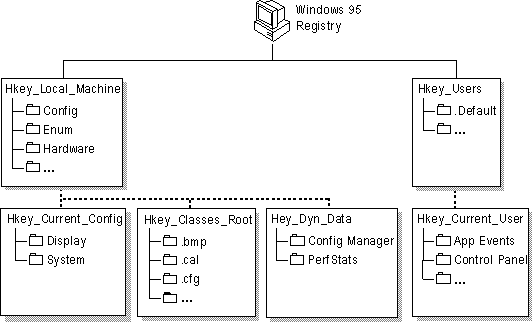
The Windows 95 Registry structure represents database information specific to the computer and to individual users. The computer-specific information includes setting for hardware and software installed on the computer. The user-specific information includes settings in user profiles, such as desktop settings, preferences for certain software, and personal printer and network settings.
In the Registry, each individual key can contain data items called value entries and can also contain additional subkeys, with keys roughly analogous to directories, and value entries analogous to files. Each of the root key names begins with "Hkey_" to indicate to software developers that the key is a unique identifier, called a handle, that can be used by a program to access resources.
The following briefly describes the Registry subtrees. More details are provided later in this chapter.

Hkey_Local_Machine.
This key contains computer-specific information about the type of hardware installed, software settings, and other information. This information is used for all users who log on to this computer.
Hkey_Current_Config.
This key points to a branch of Hkey_Local_Machine\Config that contains information about the current configuration of hardware attached to the computer.
Hkey_Dyn_Data.
This key points to a branch of Hkey_Local_Machine that contains the dynamic status information for various devices as part of the Plug and Play information. This information may change as devices are added to or removed from the computer. The information for each device includes the related hardware key and the device's current status, including problems.
Hkey_Classes_Root.
This key points to a branch of Hkey_Local_Machine that describes certain software settings. This key displays the same data as it did in Windows 3.1 — essential information about OLE and association mappings to support drag-and-drop operations, Windows 95 shortcuts (which are, in fact, OLE links), and core aspects of the Windows 95 user interface.
Hkey_Users.
This key contains information about all the users who log on to the computer, including both generic and user-specific information. The generic settings are available to all users who log on to the computer. The information is made up of default settings for applications, desktop configurations, and so on. This key contains subkeys for each user that logs on to this computer.
Hkey_Current_User.
This key points to a branch of Hkey_Users for the user who is currently logged on.